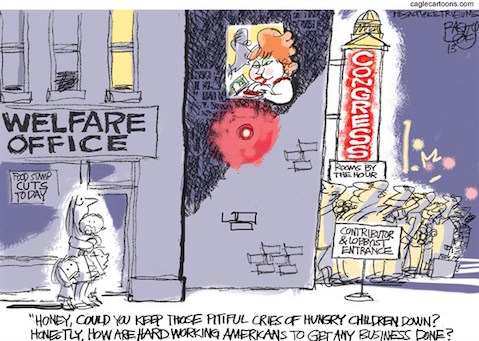Shush, Someone Might Hear You
Hunger Persists in America, and the Hungry Have No Champion

A constant in American politics, shared by both the Democratic and Republican parties and their candidates running for president, is their disdain to give volume to the issue of hunger in America. Today the silence is truly deafening, but this was not always the case.
In 1967, Senator Robert F. Kennedy traveled to Mississippi to check on the progress of the Economic Opportunity Act of 1964, better known as the War on Poverty. What he found, writes Peter Edelman in his book So Rich, So Poor, was “children, thousands of them, hungry to a point very near starvation.” Kennedy was “deeply moved and outraged,” Edelman writes, and made relieving hunger a top priority.
This year has gotten off to a raucous start with a Republican Congress itching to flex its adversarial muscle against President Obama in his last year in office. And as the presidential candidates verbally slug it out for the White House, for approximately 48 million people in this country (one out of seven Americans), their issue of survival has little chance of being debated by Democrats or Republicans. Or put in the form of a question by the media in a debate: Hunger in America affects more people than almost any other concern this country faces and yet receives almost no air time from political parties or media outlets.
The Bill Cosby sexual assault case in the last month surely received more attention than people not having enough to eat in the last year. These kind of tabloid stories only clouds the facts that a nation considered a global superpower cannot eliminate hunger for every man, women, and child here in its own backyard. Thus the problem of hunger doesn’t go away, but rather is prolonged indefinitely.
Fourteen percent of households in the U.S. were food insecure in 2014. Another 6 percent were subject to low food security. Almost 50 percent of households that were food insecure had children, and 5.4 million seniors were also faced with going hungry. These figures, which changed little in 2014 compared to 2013, were not expected to improve significantly in 2015. And despite the evidence that little or no progress was being made, a Republican congressional majority pushed for cuts to the SNAP program that resulted in a loss of an estimated $5 billion in 2014 and another $6 billion in 2015 and 2016. SNAP, or Supplemental Nutrition Assistance Program, is designed to assist low- or no-income families. Though the name has been changed from the original name, the Food Stamp Program, the stigma remains for people who must use this assistance, despite the fact that only food can be purchased with the EBT (electronic benefit transfer) cards provided.
According to the Center on Budget and Policy Priorities, SNAP has been this country’s most important anti-hunger program. Statistics show that food insecurity exists across the country in every county. Despite Robert Kennedy’s outrage, a county in Mississippi, Humphreys, has the highest at 33 percent. Surely this was not what Kennedy could have imagined in the almost 50 years since his visit to the Mississippi Delta.
In a report by the CDC (Centers for Disease Control), access to healthy food not only benefits those who suffer from hunger but may also promote economic development for farmers, retail stores, and other businesses that produce food. Additionally, a child going to school will be a much better student if he or she receives proper nutrition. Despite these facts and SNAP’s success at fighting hunger, the program still goes on the chopping block. Conservative ideology that promotes more cuts to this program may be driven by the fever of budget battles or a lack of political courage. Then there’s the view of politicians on both sides of the aisle that issues that score political points — like abortion, same-sex marriage, or terrorism — will fire up their bases and voters far more than children going to bed at night with an empty stomach. Hunger in America seems to have neither the urgency nor the appeal to give fortunate, well-fed Americans a reason for pause and reflection.
Perhaps a more underlying and disturbing aspect is the notion by some that those who are unable to afford to eat are in some way responsible for their own plight. This attitude prevails even though many of the people who rely on SNAP or food banks or charities actually do work but do not earn enough money to cover all the expenses of food and shelter.
This year the noise of a presidential election will dominate the 24/7 news cycle. Presidential candidates wary of being enablers to the poor will not risk bringing the problem of hunger to their political forums. The media will see as folly wasting valuable air time when ratings, not actual news stories, drive the news departments of entertainment divisions of the major networks.
For those who go hungry and those who worry how to feed their families, there will be no champion for their cause. And 48 million disenfranchised Americans will be ignored by candidates and the media who cover them. They become victims in a nation that hungers more for salacious stories and empty campaign rhetoric.



